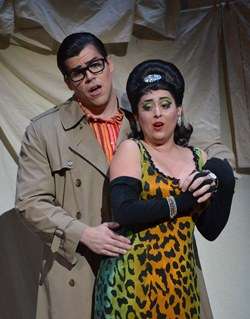|
Back
High-spirited Vulgarity Saves the Day Miami
Adrienne Arsht Center for the Performing Arts
05/07/2016 - & May 8*, 10, 13, 14, 2016
Gaetano Donizetti: Don Pasquale
Kristopher Irmiter (Don Pasquale), Marco Nisticò (Malatesta), Daniel Bates (Ernesto), Elena Galván (Norina), Zachary Elmassian (Notary)
Florida Grand Opera Orchestra and Chorus, Katherine Kozak (chorus master), Ramón Tebar (conductor)
Renaud Doucet (director), André Barbe (scenery and costume design), Guy Simard (lighting design)

D. Bates, E. Galván (© Lorne Grandison)
This ever fresh comedy gets a makeover. Probably because the libretto is so unsubtle it easily lends itself to updated conceptualizations; with such magnificent music, there is potential for a great theatre experience regardless how one responds to the approach.
With this production we get a new take on the silliness. Poor Ernesto has an even less hopeful future than is usual. His mentor/employer, Don Pasquale, runs a tacky pensione frequented by guests of equal caliber. Ernesto works the front desk and it appears that his love, Norina is a crude waitress at the establishment’s rooftop café. It all works well and the pace of this breezy sitcom never slogs.
The musical results are not as clever or satisfying. Ramón Tebar’s exuberant delivery of the graceful, cheerful overture is undercut by the director’s need to give background on the current state of the story’s main characters. The jokes and concept are okay but not good enough to interfere with such beautifully executed delicious melodic froth.
With such wonderful makeup and costuming, a basso gets an opportunity to score a giant victory. Kristopher Irmiter as the title character lacks sonority making his interpretation of this wonderful buffoon nearly a cipher. The humorous double agent, Malatesta is given some of the score’s most beguiling moments, but Marco Nisticò also lacks vocal heft and agility making his presence negligible. Their duet Cheti, cheti immantinente (one of opera’s most lively moments) is left inert as neither performer appears interested in his role.
Thank goodness the young lovers are the perfect antidote giving this performance the zest it requires. Elena Galván’s vocal youth is matched by her understanding of Norina’s prickly nature; her famous slap really stings. This combination gives the performance its drive. Norina’s many high notes provide a coloratura roller coaster and though some might not feel as secure as others, they are always on pitch, strong and beautiful; Galván is the real thing. Let’s hope that companies fully utilize her freshness for bel canto before she moves on to the heavier repertory
Our Ernesto, Daniel Bates has had considerable assignments with Florida Grand Opera over the last couple seasons. It has been moving to watch him struggle as he found his way. Always a lovely voice, with Ernesto, he is now in full command. As an actor he fully inhabits the director’s idea of making this young man a loveable nerd. His embarrassing fashion sense will touchingly remind his fellow nerds of their struggle through the 1960s. From Sogno soave e casto onward, Bates hit the target. He and Galván achieve the performance’s most well received moment with their incredibly tender Tornami a dir’ che m’ami. In all fairness Donizetti gave them a lot to work with, and they wisely never tried to upstaged him.
Further praise must go to the chorus. Though never a looming presence in this opera, its confusion is much more significantly evident under Renaud Doucet’s thoughtful direction. Imagine the lunacy at this pensione when from the moment of the proprietor’s wedding, the lobby has been given an extreme makeover and the staff has increased tenfold within just a matter of hours; the poor tourists.
With this comes André Barbe’s witty designs that speak to those of us who grew up on 1960s TV and to lovers of Ricki Lake’s Tracy Turnblad. The lighting of Guy Simard fully captures the era.
One wonders the reasons this piece has never achieved the popularity of lesser works. It is arguable that Don Pasquale‘s libretto is not as strongly realized as other Italian comedies. But do most audiences attend opera because of the narrative? And this opera is arguably Donizetti’s most ebullient and touching score.
Jeff Haller
|